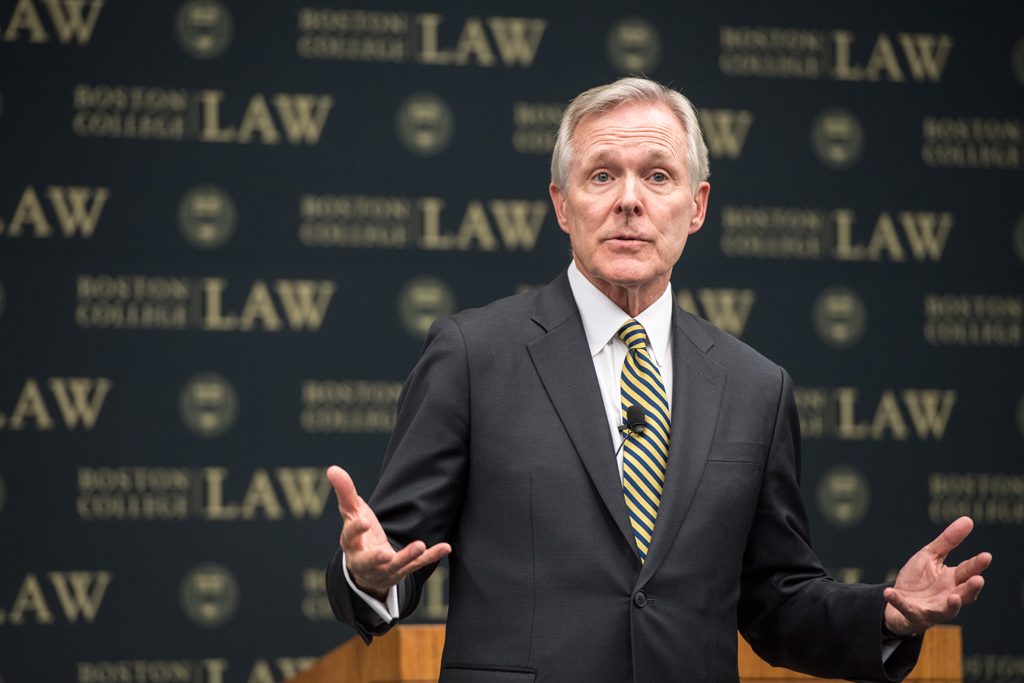US Secretary of the Navy and former Mississippi Governor Ray Mabus presented the inaugural talk in the Dean’s Distinguished Lecture Series September 20, giving the BC Law community insight into his career in public service before fielding a range of questions from climate change to the Navy’s crucial role backing US policy in the Middle East.
Mabus, a Harvard Law graduate and the longest tenured Navy Secretary since World War I, first outlined his initiatives to modernize the Navy’s operations and, in particular, to catch its personnel strategy up to the needs of the 21st century.
Among other fiscal and technical accomplishments, the Mississippi native noted expanding the fleet, optimizing maintenance expenditures, increasing the use of renewable power sources, and strengthening the Acquisition Integrity Office. That office now reviews more than 1,100 cases annually, some 10 times the number before he was appointed in 2008, by using a newly developed set of accounting “trip wires” designed to snuff out corruption.
The Secretary was equally proud, though, of his work pursuing equality of access, improving quality of life for the Navy’s personnel, and getting the word out about the greatness of the armed forces’ work in the world.
“You have to forge trust day in and day out, connect America’s ‘away team’ with the American people,” he told the audience. “There is danger in any democracy where those doing the protecting are too distant from those being protected. When I was growing up, everyone knew people in our military; today, we don’t see how hard they work and how good they are at it as much. So we try to do things that reconnect us to the American people.”
Part of this, Secretary Mabus said, is ceremonial—for example, he’s set a naming convention for a newly ordered class of ships around modern civil rights leaders. But it’s also about making life in the Navy more closely reflect new social norms, from ending Don’t Ask, Don’t Tell and gender-specific uniforms to bringing women into combat roles, and smaller improvements like expanded childcare offerings on bases and more flexible leave programs.
“Historically, every time we’ve diversified our force, we’ve been better for it and I ultimately believe, when you’re in action, all you need to know is that the person next to you is your equal, in abilities and training,” he explained. “We also realized that it’s not in our interest to have our people choose between starting a family and staying on with us. Their experience is so valuable and when they walk away, we lose that investment.”
Reflecting on a career in politics that began in the Mississippi state auditor’s office, the Secretary argued that legal education ought to reflect a personal pursuit of justice, by acquiring the skills needed to achieve what the country, and the world, need—including an understanding of the challenges involved.
Several of these were articulated during the Q&A session, when the Secretary assessed the effects of climate change on naval operations, recent news of misconduct among high-level officials in the military (“We always announce it as a matter of policy,” he said of the Navy), working with today’s Congress, and the value of seaborne remote strike capability in coping with the conflicts in Syria and Iraq.
In the end, the Secretary’s parting advice about public service was borrowed from his father, owner of a small hardware store in Ackerman, Miss., and an arborist. In his last days, the senior Mabus set out to plant a small forest around the area, knowing he probably wouldn’t live to see the forest mature. But that, the Secretary said, was less the goal than that he was thinking selflessly, leaving a legacy for his family and the community. “Go out there,” he said, “and plant thousands of trees.”
Story by Tim Bourgaize Murray ’19.
Photograph by Christopher Soldt, MTS, BC


